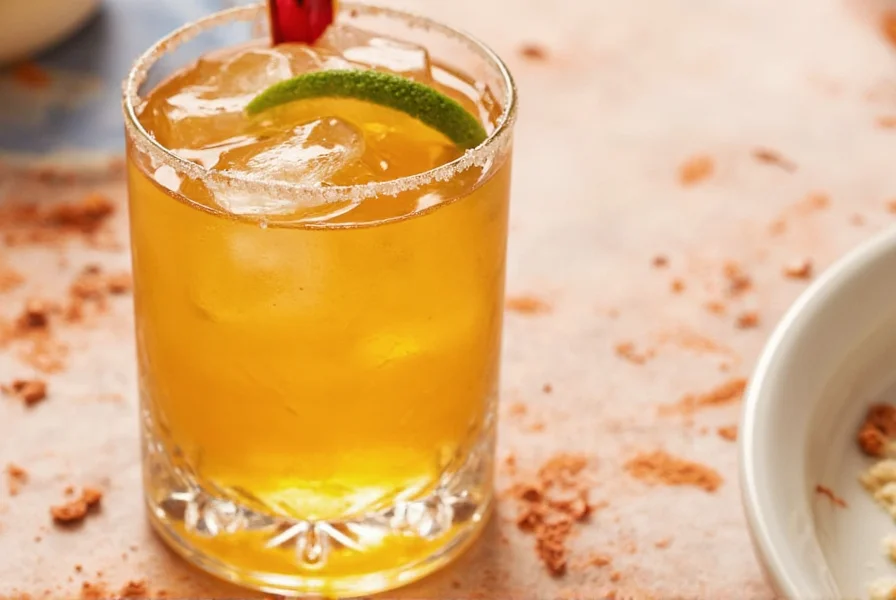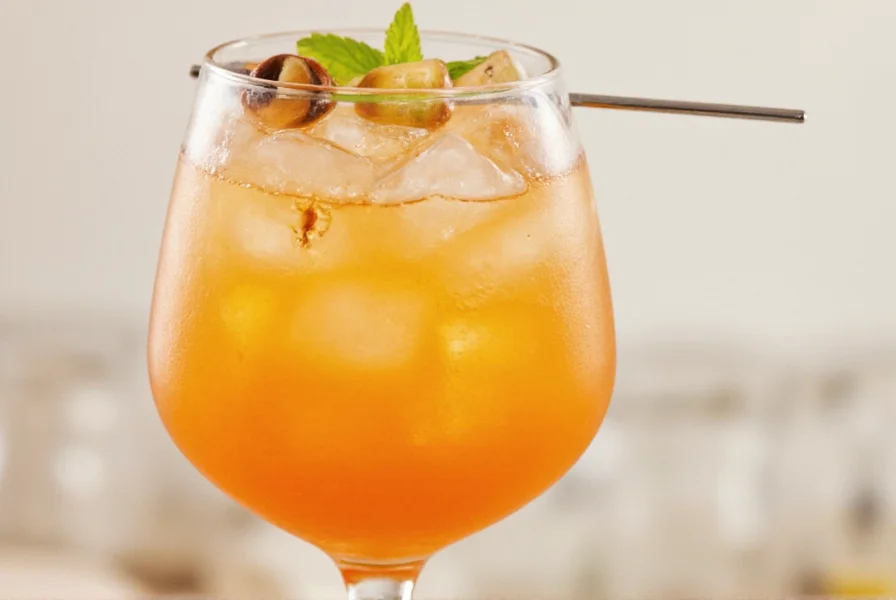If you've encountered the term ginger's revenge and wondered what makes this drink stand out in cocktail culture, you're not alone. This increasingly popular beverage has earned its dramatic name through the potent combination of fiery ginger and smooth spirits that creates a memorable drinking experience with a noticeable "revenge" effect as the ginger's heat lingers.
The Origins of Ginger's Revenge Cocktail
The name "Ginger's Revenge" cleverly plays on the ginger root's natural spiciness that seems to "take revenge" on drinkers with its warming, sometimes intense kick. While not attributed to a single creator, this cocktail emerged from the craft cocktail renaissance of the early 2000s when bartenders began experimenting with premium ginger beers beyond the standard Moscow Mule.
Unlike traditional ginger cocktails that often mask the ginger flavor, Ginger's Revenge celebrates and amplifies it, creating a drink where the ginger isn't just a supporting player but the star of the show with its distinctive bite that "gets back" at you moments after swallowing.
Essential Ingredients for an Authentic Ginger's Revenge
Creating a proper Ginger's Revenge requires attention to ingredient quality. The "revenge" effect comes from using ginger products with genuine heat rather than overly sweetened commercial versions.
| Ingredient | Recommended Amount | Quality Notes |
|---|---|---|
| Bourbon or Rye Whiskey | 2 oz (60ml) | Mid-range quality with caramel notes balances the ginger's heat |
| Fresh Ginger Beer | 4-5 oz (120-150ml) | Look for "hard" ginger beer with visible sediment and spicy kick |
| Fresh Lime Juice | 0.5 oz (15ml) | Essential for balancing sweetness and enhancing ginger flavor |
| Fresh Ginger Slice | 1 thick slice | For garnish and additional aromatic experience |
Step-by-Step Preparation Guide
Creating the perfect Ginger's Revenge requires proper technique to balance the ginger's natural heat with the spirit's smoothness:
- Chill a highball or copper mug glass in the freezer for 5-10 minutes
- Fill a cocktail shaker with ice, then add 2 oz bourbon and 0.5 oz fresh lime juice
- Shake vigorously for 15 seconds to properly chill and integrate ingredients
- Strain into your chilled glass over fresh ice
- Gently pour 4-5 oz of quality ginger beer over the back of a spoon to maintain carbonation
- Give one gentle stir to combine without losing bubbles
- Garnish with a thick slice of fresh ginger and optional lime wedge
The key to experiencing the true "revenge" effect lies in the ginger beer selection. Mass-market ginger ales typically lack the necessary heat, while artisanal ginger beers with visible sediment and a pronounced spicy finish deliver the signature delayed burn that gives this cocktail its name.
Mastering the Ginger's Revenge Experience
Understanding how to properly consume Ginger's Revenge enhances the experience. The "revenge" isn't immediate—it builds gradually as the ginger's volatile compounds interact with your palate. The initial sip feels relatively smooth, but within 15-30 seconds, the ginger's heat emerges, creating that distinctive revenge effect.
For those new to spicy cocktails, start with a smaller amount of ginger beer and gradually increase as your palate adjusts. The ideal balance allows you to enjoy multiple sips without overwhelming heat, yet still delivers that signature ginger "revenge" with each drink.
Popular Variations for Different Preferences
While the classic bourbon version remains most popular, several thoughtful variations cater to different tastes while maintaining the essential "revenge" characteristic:
- Vodka Ginger's Revenge - For a cleaner profile that lets the ginger shine
- Dark Rum Version - Adds molasses notes that complement ginger's spice
- Non-Alcoholic Revenge - Quality ginger beer with lime and bitters
- Maple-Infused - 0.25 oz maple syrup balances extreme heat
- Smoked Version - Whiskey smoked with applewood enhances complexity

Avoiding Common Ginger's Revenge Mistakes
Many home mixologists make errors that diminish the authentic Ginger's Revenge experience:
- Using ginger ale instead of proper ginger beer (lacks necessary heat)
- Over-diluting with too much ice (waters down the "revenge" effect)
- Using bottled lime juice (lacks brightness to balance ginger)
- Stirring too vigorously after adding ginger beer (loses carbonation)
- Selecting overly sweet ginger products (masks the spicy "revenge")
For the most authentic how to make ginger's revenge cocktail experience, seek out artisanal ginger beers labeled "hard" or "spicy" that list ginger root as the primary ingredient rather than high fructose corn syrup. The best products will have visible sediment and a pronounced spicy finish that builds gradually—the hallmark of a proper ginger's revenge bourbon recipe.
When Ginger's Revenge Shines: Perfect Pairing Opportunities
This cocktail particularly excels in specific settings where its warming properties and distinctive flavor profile enhance the experience:
- Cooler weather occasions (fall and winter months)
- After-dinner drinks that aid digestion
- Complementing spicy Asian or Caribbean cuisine
- Cocktail parties where conversation flows with each "revenge" sip
- As a sophisticated alternative to basic mixed drinks
The gradual build of heat makes ginger's revenge cocktail instructions particularly interesting for cocktail enthusiasts who appreciate drinks with evolving flavor profiles. Unlike many cocktails that deliver their entire experience immediately, Ginger's Revenge offers a delayed response that creates conversation and keeps drinkers engaged with each subsequent sip.
Perfecting Your Homemade Ginger's Revenge
For those committed to mastering this spicy delight, consider these advanced tips for the ultimate homemade ginger's revenge drink:
- Create your own ginger syrup using fresh ginger, sugar, and water for complete control over spice level
- Experiment with different bourbon proofs to find your ideal heat balance
- Add a single dash of aromatic bitters to enhance complexity without masking ginger
- Chill your ginger beer separately for maximum carbonation retention
- Use filtered water for ice to prevent flavor contamination
Remember that the "revenge" in ginger's revenge isn't meant to be punishing—it should be a pleasant, warming sensation that enhances rather than overwhelms the drinking experience. The best versions deliver a noticeable kick that invites another sip rather than discouraging it.
What makes Ginger's Revenge different from a Moscow Mule?
While both feature ginger beer, Ginger's Revenge specifically uses bourbon rather than vodka and emphasizes the ginger's spicy 'revenge' effect through careful ingredient selection. Moscow Mules typically use milder ginger beer and focus on refreshment rather than the delayed heat sensation that defines Ginger's Revenge.
Why is it called 'Revenge' in Ginger's Revenge cocktail?
The name refers to the delayed spicy sensation that builds after swallowing. Unlike immediate heat from peppers, ginger's warmth emerges 15-30 seconds later, creating the sensation that the ginger is 'getting back' at you with each sip - hence the 'revenge' in the name.
Can I make a non-alcoholic version of Ginger's Revenge?
Yes, you can create a satisfying non-alcoholic version by using high-quality spicy ginger beer, fresh lime juice, and adding complexity with aromatic bitters or a small amount of maple syrup. The key is selecting a ginger product with genuine heat to maintain the signature 'revenge' effect without alcohol.
What's the best ginger beer for authentic Ginger's Revenge?
Look for artisanal 'hard' ginger beers with visible sediment and a pronounced spicy finish. Brands like Fever-Tree, Q Mixers, or Bundaberg often work well, but local craft options with higher ginger content typically deliver the best 'revenge' effect. Avoid overly sweet ginger ales which lack the necessary heat.
How can I reduce the heat in Ginger's Revenge if I'm sensitive to spice?
To moderate the heat while preserving flavor, try using a 50/50 mix of spicy ginger beer and milder ginger ale, adding a small amount of maple syrup (0.25 oz), or increasing the bourbon ratio slightly. You can also let the drink sit for 2-3 minutes before drinking, as this allows some carbonation (which enhances heat perception) to dissipate.











 浙公网安备
33010002000092号
浙公网安备
33010002000092号 浙B2-20120091-4
浙B2-20120091-4